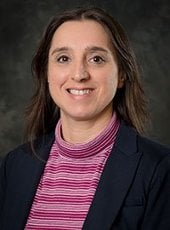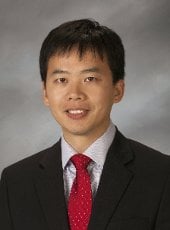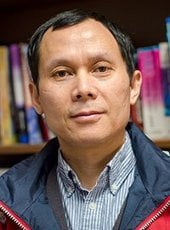 Dr. Loredana Valenzano and graduate student Gemechis D. Degaga published the paper “Part II: quantum mechanical prediction of heats of adsorption for C2-C4 hydrocarbons in MOF-74-Mg/Zn periodic structures” on Chemical Physics Letters.
Dr. Loredana Valenzano and graduate student Gemechis D. Degaga published the paper “Part II: quantum mechanical prediction of heats of adsorption for C2-C4 hydrocarbons in MOF-74-Mg/Zn periodic structures” on Chemical Physics Letters.
 Dr. Loredana Valenzano and graduate student Gemechis D. Degaga published the paper “Part II: quantum mechanical prediction of heats of adsorption for C2-C4 hydrocarbons in MOF-74-Mg/Zn periodic structures” on Chemical Physics Letters.
Dr. Loredana Valenzano and graduate student Gemechis D. Degaga published the paper “Part II: quantum mechanical prediction of heats of adsorption for C2-C4 hydrocarbons in MOF-74-Mg/Zn periodic structures” on Chemical Physics Letters.
 There is something very noble about Xiaohu Xia’s research. He wants to use palladium, platinum, ruthenium and other corrosion-resistant metals to refine tests to detect biomarkers for cancer and infectious diseases. To do so, he plans to use nanostructures made of these noble metals that mimic natural enzymes and has earned a CAREER Award from the National Science Foundation (NSF) to focus on this research.
There is something very noble about Xiaohu Xia’s research. He wants to use palladium, platinum, ruthenium and other corrosion-resistant metals to refine tests to detect biomarkers for cancer and infectious diseases. To do so, he plans to use nanostructures made of these noble metals that mimic natural enzymes and has earned a CAREER Award from the National Science Foundation (NSF) to focus on this research.
The grant covers five years, totaling $457,783, and enables Xia to dig deep into the structure-property relationships of the bimetallic peroxidase mimics at the atomic level. Even small changes in nanostructures can produce big results, demonstrated by his lab with improvements in the catalytic efficiencies of iridium-coated palladium and ruthenium nanostructures.
Read the full story on the Michigan Tech news website.
 Science360, a science news website published by the National Science Foundation (NSF) featured the synthetic DNA research of Professor Shiyue Fang (Chem) as one of its “Headlines.”
Science360, a science news website published by the National Science Foundation (NSF) featured the synthetic DNA research of Professor Shiyue Fang (Chem) as one of its “Headlines.”
Tarun Dam led a new study, published this week in Biochemistry, examining the biomechanics of galectin-3’s interaction with glycosaminoglycans (GAG) and proteoglycans. His team includes graduate students Melanie Talaga, Ni Fan, Ashli Fueri, Robert Brown and Research Assistant Professor Purnima Bandyopadhyay.
At the Laboratory of Mechanistic Glycobiology, Dam and his students study the sugar, including glucose and other structural, complex sugars, that fuel our bodies. GAGs assist in controlling growth factor proteins, which go unchecked as cancerous tumors grow.
Even though the findings of the study were unexpected, it opens up new possibilities for understanding glycobiology and biomechanics. “Seeing galectin-3 interact with GAGs and proteoglycans is like finding a rose in the petunias—it’s very unexpected,” Dam says. “It’s fair to say that this requires revisiting the reported biological functions of GAGs, proteoglycans and galectin-3.”
Next, Dam and his team look into additional research, “Now we have to reconsider the whole drama, retracing the steps and actions of that character… we are using cell lines and animal models to study this interaction in a cellular context.”
Read more on Michigan Tech News, by Allison Mills.
Dr. Pat Heiden’s student, Ning Chen, presented at the 42nd Central ACS Regional Meeting in Indianapolis IN in June 2011 as well as at the 243rd American Chemical Society (ACS) National Meeting in Anaheim CA in March 2011. Here are some photos of Ning with his poster:
ACS meetings are an excellent opportunity for students! Reach 12,000 chemical professionals at each 2012 national meeting or at other events throughout the year, including regional meetings.